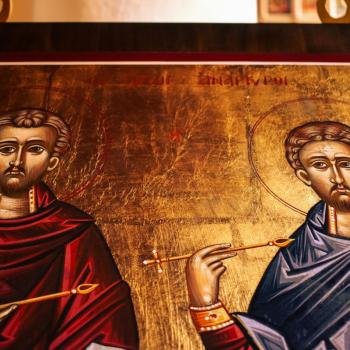What’s The Apocalyptic Doing in Advent?

The Gospel reading, Mark 13:24 – 37 belongs to the genre of apocalyptic language. What were our lectionary editors thinking? Apocalyptic language on the first day of the new church year seems a bit overdramatic. Who wants a “darkened sun” for Advent?
Wouldn’t we rather ease into Advent? Even in church we have come to expect comfort and convenience. My grandaddy was a Baptist preacher and he said the church went downhill when they added cushions to the pews. What if Advent aims to undo comfort and convenience? What if Advent is the most countercultural season of the year? Our culture – impatience. Advent – waiting patiently. Our culture – convenience. Advent – struggle, anticipation. Our culture – comfort. Advent – the pain and the agony of long waiting.
Mark hits us on a cold December morning when we are sleeping under the comforter as a cold splash of water. Advent needs apocalyptic language to shake us from our doldrums. Not the doom and gloom of apocalyptic preachers like Robert Jeffress, but apocalyptic literature as in “revelation.” Apocalyptic is neither an esoteric mystery nor a breathless blueprint for the future.
New Testament scholar Joel Marcus reminds us that the setting for Mark 13 is the Temple. Jesus has viewed the Temple (Mark 11:11), “cleansed it,” (Mark 11:15 – 19), continuously argued in it (11:27 – 12:44), and in Mark 13 pronounces its doom. Mark 13:1-23 is full of Markan vocabulary and themes and serves to “hook the ‘little apocalypse, which is presumably pre-Markan, into the larger story.”
Reading Mark’s passage without a road map to the apocalyptic genre would be a colossal waste of time. What do we mean when we say apocalyptic? Northrop Frye, literary critic, in Anatomy of Criticism says, “The universe of poetry, however, is a literary universe, and not a separate existential universe. Apocalypse means revelation, and when art becomes apocalyptic, it reveals. But it reveals only on its own terms, and in its own forms: it does not describe or represent a separate content of revelation.”
James Darsey, in The Prophetic Tradition and Radical Rhetoric in America, notes that the language of apocalyptic is “highly metaphorical and symbolic.” Mark 13 enters a total world of metaphor. Jesus is not coming to smite the nations but to save the nations. Darsey also demonstrates that the apocalyptic is not prophetic. The prophetic imagination works in historical, realistic settings; apocalyptic is a wild carnival ride.
Apocalyptic texts require a warning label: Handle with Care. According to rhetorical scholar Robert L. Ivie, “Apocalypse in both religious and secular variations signals a significant crisis, an impending catastrophe, a prophetic revelation, and a promise of salvation.” Our current political confusion “symbolizes the turmoil of imperial overreach.” The number of clowns, con artists, and preachers in power “reflects the crisis at hand.”

Photo by João Saplak
Advent comes in a large box wrapped in stark, vivid, full-color wrapping paper with visions of a darkened sun, a useless moon, falling stars, an earthquake that shakes the universe, and the Son of Man coming in the clouds, and angels rounding up God’s people. But it’s the “gift” in the box that matters, and that gift is the Advent of the Messiah.
In The Original Revolution, John Howard Yoder argues that the church is in constant danger of confusing the kingdom itself with the benefits of the kingdom. What matters in Mark’s message is not the container but the contents.
I’m saying that Advent challenges the entire emotional, intellectual, and spiritual structure of how we are living. Advent refuses to do business with the doom and gloom theology of so many evangelicals. Advent isn’t the end; Advent is the beginning.
Expectation and Newness
Perhaps the church has allowed the “New Testament” to become “old news.” Or some have turned the “good news” into “bad news. But here’s what I have read in the New Testament: New heaven and new earth! A new Jerusalem! A new song. A new wine. There’s the “new being” Christians are supposed to become. There is the praise of the God who promises, “Behold, I make all things new.”
James Cox, publisher of the Dayton Daily News, of Wright brothers flying in a field just outside Dayton received no coverage. “Our news staff would not believe the stories.” When the city editor of the Daily News, why there was no coverage: “I guess the truth is that we were just plain dumb.” (McCullough, David. The Wright Brothers (pp. 116-117). Simon & Schuster. Kindle Edition).
Advent declares the expectation of the new – something so new it had never happened before – a Messiah, a Savior. Now, saying the name of Jesus or singing his praises can’t save us from our sameness, our listlessness, our feelings of being left out, the anger in our daily lives; he cannot save us, unless we yearn for the unexpected, unless we are convinced that life is too short to keep doing the same old thing day after day.
William Sloane Coffin, Jr. told the Riverside Congregation on December 3, 1978: “Let this first Sunday of Advent be full of expectations, and let the message be, unless you say, ‘There must be something more, you’re living something less than life. Unless you say, “Wake, wake, the night is flying,’ you’ll never see the dawn of a new day, neither in your life nor in the life of this nation. In other words, unless you say, ‘There is hope,’ you’re hopeless!”
Advent’s Master Trope: Yearning

Yearning means to have an intense feeling of longing for something. I at least touch the hem of the garment of “Yearning.” Each week I yearn with all my heart to preach the best possible sermon. When the preacher’s yearning meets the congregation’s yearning in worship something new happens.
The Psalmists – Our Yearning Teachers
I think the ancient church was on to something essential when they put all those readings from the Psalms in Sunday worship. Nobody could yearn like a psalmist! The psalms give yearning lessons.
“My soul longs for the courts of the Lord; my heart and my flesh sing for joy to the living God” (Psalm 84:2).
“O God, you are my God; I seek you; my soul thirsts for you; as in a dry and weary land where there is no water.” (Psalm 63:1).
The Prophets Pathos: Yearning
Habakkuk yearned for an end to violence. “O Lord, how long shall I cry for help,
and you will not listen? Or cry to you ‘Violence!’ and you will not save?”
Isaiah yearned for the people who walk in darkness to see a great light, and for a child to be born, and “his name will be called Wonderful Counselor, Mighty God, Eternal Father, Prince of Peace. There will be no end to the increase of his government or of peace.”
No wonder Jesus, with the psalter embedded in his heart, offers to his followers, “Blessed are those who hunger and thirst for righteousness.”
And that’s why we are not singing Christmas carols this Sunday or the next three Sundays after today. Our hymns will be yearning hymns, preparation hymns, anticipatory hymns.
“O Come, O Come Emmanuel”
In a world at war in Ukraine, Palestine, and other hot spots, we simply must make the space to pray:
O come, desire of nations, bind
In one the hearts of all mankind
Bid Thou our sad divisions cease
We simply must find a way to yearn for release from the denigrating emotions of feeling angry, conflicted, ignored, trapped, besieged, tired, and shamed.
O come, Thou Dayspring, come and cheer
Our spirits by Thine advent here
Disperse the gloomy clouds of night
And death’s dark shadows put to flight
Advent has arrived in full-orbed yearning. Never have we needed our Savior more.













